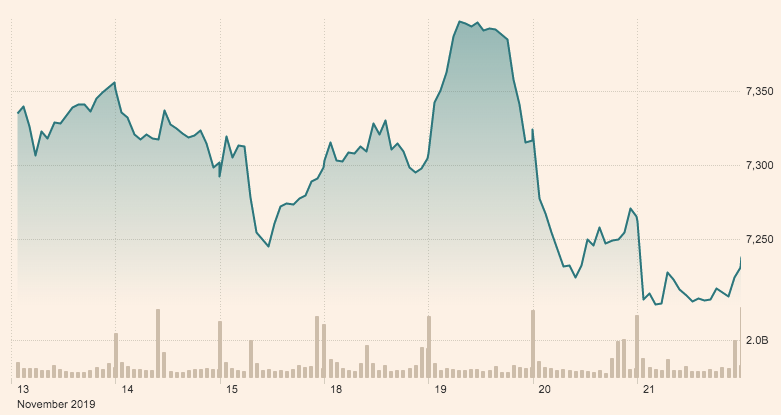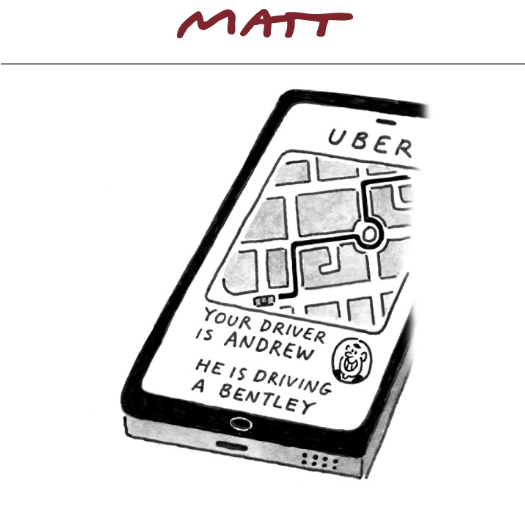- Charlotte Street Partners

- Nov 22, 2019
- 5 min read
Updated: Dec 2, 2019
22nd November 2019
Written by Javier Maquieira, Associate
Edited by Harriet Moll, Creative Director
Good morning,
Donald Trump doesn’t have a favourite news network anymore. As the second week of public impeachment drama came to an end, the president of the United States lashed out at Fox News after host Shannon Bream interviewed a Democratic congressman investigating his conduct on Wednesday evening. The president tweeted: “Fox should stay with the people that got them there, not losers!” But his reaction is only natural: Trump’s world of favours and loyalties is under attack, and “traitors” seem to abound in the House Intelligence Committee, which is holding the impeachment inquiry into the president over allegations that he offered Ukraine military aid in return for a corruption investigation into the son of the leading Democratic presidential candidate, Joe Biden. Wednesday’s session saw Gordon Sondland, Trump’s handpicked ambassador to the European Union, blow up many of the arguments Republicans used to defend the president. Testifying under oath, Sondland said that a quid pro quo between Ukraine’s Volodymyr Zelensky and Trump was exactly the president’s intent, adding that “everyone was in the loop” and it was “no secret.” That is one bombshell revelation, to which Trump later responded with huge notes that he had handwritten himself with one of those Sharpies he’s known for. Yesterday was the turn of Fiona Hill, former senior director for European and Russian affairs on the National Security Council. According to her testimony, the theory that Ukraine, rather than Russia, had interfered in the 2016 US presidential election was “a fictional narrative” pursued by president Trump and his personal lawyer, Rudy Giuliani, and “propagated by the Russian security services themselves.” Hill testified alongside David Holmes, a US diplomat in Kyiv that repeated he had overheard Trump ask about “investigations” on a call with ambassador Sondland. Theirs was the seventh and probably last impeachment hearing. Now Congress must decide whether president Trump’s conduct was impeachable. If found guilty in a majority vote, he will face an impeachment trial in the Republican-controlled Senate, where two-thirds of members would then need to vote for Trump to be removed from office. Even when defending the US president has got harder, the GOP should think twice before turning a blind eye on Trump’s alleged wrongdoing. Otherwise, they risk a situation in which future presidents can feel entitled to use foreign policy for personal gain and get away with it.
News
Labour leader Jeremy Corbyn has launched the party’s general election manifesto, which pledges to “transform” the UK and renationalise rail, mail, water, and energy. Corbyn vowed to get the country on track for a net-zero carbon system by the 2030s and scrap rises in the state pension age. Additionally, the Labour party wants to renegotiate a new Brexit deal to be put to a “legally binding” referendum and says it would not allow a second vote on Scottish independence “in the early years” if they win the election. The former first minister of Scotland, Alex Salmond, appeared in a preliminary hearing at the High Court in Edinburgh yesterday to face charges of sexual assault against ten women, including an attempted rape inside Bute House in 2014. Salmond told reporters after the hearing that he had pleaded not guilty to all charges, adding that he is “innocent and will defend my position vigorously.” Israel’s prime minister, Benjamin Netanyahu, will be indicted on charges of bribery, fraud, and breach of trust. The three separate corruption cases announced by Israel’s attorney general are a significant blow to Netanyahu, who has defiantly vowed to hold on to power and condemned the charges as a “coup.” It is the first time in the country’s history that a sitting PM faces indictment in criminal investigations, even when the current situation of deadlocked parliament may delay a formal indictment for months.
Business and economy
Hedge fund manager Louis Bacon is expected to shut down Moore Capital after 30 years of trading. The firm, which has been hit by declining performance at some of its funds, had $10.2bn assets under management in 2018 and intends to return capital to investors. Bacon helped popularise trading on a macro basis, with Moore Capital focusing on macroeconomic themes in its portfolios and trades stocks, bonds, and currencies. Buckingham Palace has stated that Prince Andrew will continue to be involved with his business mentoring initiative, Pitch@Palace, which builds ties between the corporate world and tech startups. However, the palace has said that it “will look at how he takes this forward outside of his public duties, and outside of the palace” as some corporate partners such as BT have been abandoning the initiative in recent days. Google has announced it will ban political advertisers from targeting audiences based upon their political preferences ahead of the UK’s general election and in the rest of the world in January. The decision, which comes as the company faces criticism over its advertising policies, will impact search ads, display advertisements, and YouTube. Although advertisements targeting people based on their political profile is already unlawful in the UK, it is unclear if the internet giant has run such campaigns during this general election.
Markets
What happened yesterday?
London stocks remained low on Thursday on concerns over the trajectory of trade negotiations between China and the US. The FTSE 100 ended the session down 0.33% at 7,238.55, while the pound was 0.09% weaker against the dollar at $1.2913 and flat on the euro at €1.1671. In corporate news, Johnson Matthey (-7.06%) was down after the chemical company said half-year pre-tax profit declined eight per cent while net debt rose. Royal Mail (-14.2%) plunged after it announced its transformation programme was behind schedule, cut its interim dividend, and warned of a "challenging" outlook for the letters business in the UK. Carnival (-2.12%) and B&M European Value Retail (-3.07%) were also trading lower. On the upside, Centrica (+9.11%) maintained its momentum following backing of its full-year guidance and an increase in its efficiency savings forecast by £50m to £300m. British American Tobacco (+3.86%), Imperial Brands (+1.1%), Direct Line (+6.37), and Admiral (+1.63%) were among the risers, too. On Wall Street, the S&P 500 closed 0.4% lower amid concerns about a lack of progress in Sino-American trade talks. According to Reuters, a phase one trade deal between the US and China might not be agreed this year, even when China's top negotiator, Liu He, is “cautiously optimistic.”
What's happening today?
AGMs
Crystal Amber Eqtec Mc Mining Sylvania Pl
UK Economic Announcements
(11:00) CBI Distributive Trades Surveys
Int. Economic Announcements
(07:00) Gross Domestic Product (GER) (15:00) U. of Michigan Confidence (US)

Columns of note
Writing in The Times, Ed Conway asks whether Britain could really change its economic model even if it wanted to. Although the country’s welfare state is bigger and the armed forces smaller than they used to be, the fundamental economic preferences of this generation are very much the same as our grandparents’. In Conway’s view, not even Margaret Thatcher’s transformational reforms appear to have stuck. He concludes that the worst feature of the British economic model is its short-termism in investment and infrastructure, where he casts a doubt on the effectiveness of Labour proposals like renationalising the rail. (£) In the Financial Times, Tim Harford argues that since we ignore what the decision processes of algorithms really are, we tend to believe emotionally resonant stories about famous brands. Although transparency might help, it is not an easy option when dealing with data. Trustworthiness is instead key. According to Harford, we should expect independent experts to scrutinise the algorithms that shape our lives if we are to clearly understand how they make decisions. We should be demanding proof of the claims made by software companies to avoid getting statistical snake-oil. (£)

Did you know?
When a beehive becomes too full, bees will form a “senate” comprised of older, more experienced bees to seek a new location. When a bee finds a good spot, it begins dancing to motion other bees towards it. Then, they vote on it by dancing as a collective until a consensus is reached.
Parliamentary highlights
TODAY House of Commons No business scheduled House of Lords No business scheduled Scottish Parliament No business scheduled

Comments